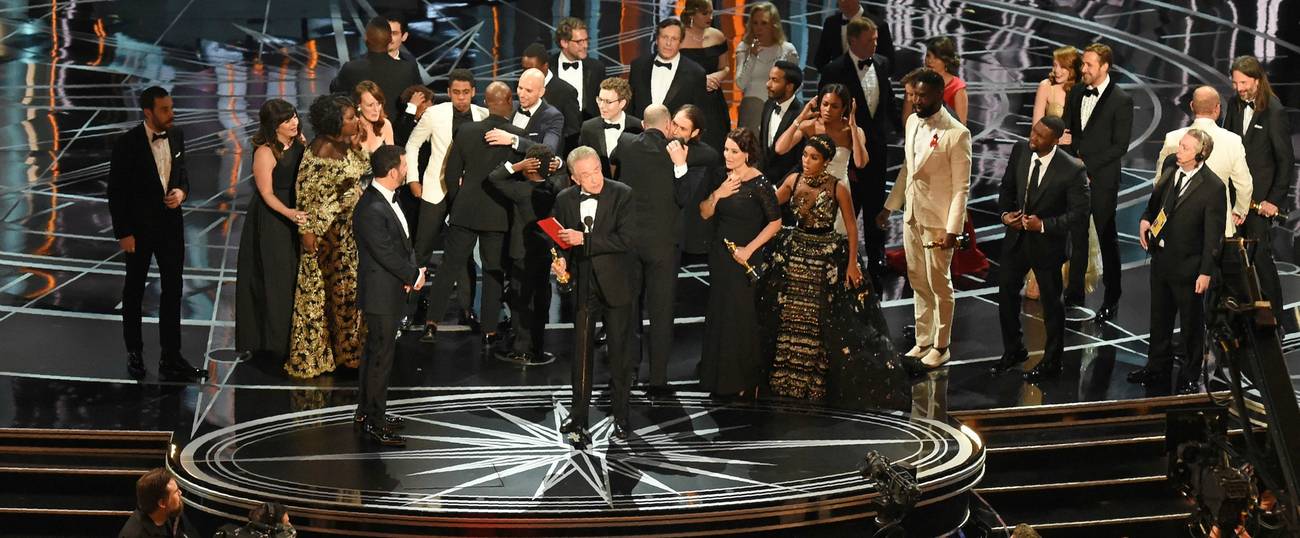The Oscars Got it Right, Even When Things Went So Wrong
And the Academy Award for ‘Best Comeback’ goes to… the Academy




Wow. You guys. Now that was an Oscars, am I right? It had everything: politics, candy, a custom Valentino dress, and the stubborn refusal of “normals” to become a Kimmel punchline, as they instead showed the world the correct way to ogle at the glowing, chemically peeled visage of Nicole Kidman, which is to say that they gazed at her through phone screens attached to a selfie trident so as not to spontaneously combust.
Oh, and did I mention the intrigue and possible treachery, right at the very end, when you thought it was safe to turn off the TV and pack up for the night. Which I did! I’ll admit it! I thought La La Land had won fair and square, so I sighed with the kind of jaded, Mitteleuropean cynicism that had overtaken me in the last few months, and I. Turned. Off. The. TV. Thankfully, however, I stayed on Twitter long enough to see all hell break loose and turned that beautiful mess back on.
I have to admit that going in, I wasn’t too optimistic about the prospects of the Oscars this year. Everyone seems depressed, mired in some post-election haze. And everything appeared set in stone. La La Land, a movie I found pleasant but essentially mediocre—you’ll have to DM me for the specifics if you’re one of the 30 people left in America with whom I haven’t gone into mind-numbing detail about it—looked set to win everything in sight, taking up at least half the broadcast. While Trump and his perfidies seemed as though they would take up the other half, the same way he has gobbled up all of pop culture as though it were one of those KFC meals he shovels into his pursed orange maw. Thankfully, that wasn’t totally the case.
Let’s begin with our host, Jimmy Kimmel. I’m not a fan of Kimmel, or late-night hosts in general, emceeing the Oscars, because they tend to turn the proceedings into a version of their own show that I’m already sick of. Did we really need an Oscars edition “Mean Tweets” for any other reason than to continue to shore up his personal brand? No, we didn’t, but it did give us a rare glimpse of Natalie Portman—the Natalie Portman, nominated for Jackie (she lost); the Natalie Portman, Mother of Us All—who was too pregnant to attend. (Believe me, I can relate.)
But then something wonderful happened: More than half an hour had gone by and it seemed like the only winners were people of color and/or immigrants, beginning with the wonderful Mahershala Ali of Moonlight, who became the first Muslim ever to win an Academy Award for Best Actor in a Supporting Role or any Oscar. Ever.
Asghar Farhadi, the Iranian director of The Salesman who was initially caught up in the travel ban and ultimately chose not to attend the ceremony in protest, won for Best Foreign Film and offered a classy statement read by Anousha Ansari, the first Iranian in space.
Viola Davis, in an emotional acceptance speech for her role in Fences, extolled August Wilson for having “exhumed and exalted the ordinary people,” and, as if on cue, a tour bus full of same came down the aisle, took their pictures with Meryl Streep and Denzel Washington and Ryan Gosling and other beautiful people. In the process, Gary from Chicago became an American folk hero. (Word on the street is that Gary from Chicago will be played by Sterling K. Brown in Ryan Murphy’s upcoming American Crime Story: Oscars, about the notorious envelope-switching scandal, which will also star Jessica Lange as Faye Dunaway and Sarah Paulson as Meryl Streep.)
It wasn’t that these Oscars weren’t political. It was that instead of a lot of impossibly wealthy white men lecturing us from the stage about the importance of diversity, we were actually seeing diversity in action. After all, protest may be powerful, but the best way to affect change is to actually win.
And that brings us to the unforgettable final moments of the telecast, which will ensure that this particular ceremony will be forever enshrined in Oscar history: that Warren Beatty was handed the wrong envelope; that, puzzled, he turned to his impatient co-presented, Faye Dunaway, to corroborate; that Faye, blithely, announced the first word she saw written on the card (La La Land as the winner); that La La Land’s host of ebullient producers, cast and crew (Benj Pasek’s mother let him quit JCC soccer to be in the school play!) took to the stage and began to accept the award, only to be told that wait, no, the announcement was wrong; and that almost unbelievably, in a stunning upset, a critically acclaimed, fantastically moving film a poor, gay and black male that was made on a really, really low-budget had actually won the Academy Award for Best Picture.
It was shocking, it was cathartic, and everyone from both films were undeniably classy and gracious about it all; they seemed like they’ll all be best friends and maybe work on a big budget remake of The Wiz together. It was a true Hollywood ending, reminding us that the world of the movies is one full of peace, blessings, and Red Vines attached to tiny silver parachutes that drop from the ceiling, and where dreams really can come true and hope never dies.
Which is all you want from the Oscars. Isn’t it?
Rachel Shukert is the author of the memoirs Have You No Shame? and Everything Is Going To Be Great,and the novel Starstruck. She is the creator of the Netflix show The Baby-Sitters Club, and a writer on such series as GLOW and Supergirl. Her Twitter feed is @rachelshukert.